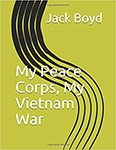Review — MY PEACE CORPS, MY VIETNAM WAR by Jack Boyd (Kenya)
 My Peace Corps, My Vietnam War
My Peace Corps, My Vietnam War
Jack Boyd (Kenya 1967–68)
Independently published, 2020
186 pages
$24.00 (paperback), $7.00 (Kindle)
Reviewed by Kevin M. Denny (Malawi 1964-66)
•
I was eager to review Jack Boyd’s book My Peace Corps, My Vietnam to see how his experience with both Peace Corps and Vietnam compared with my own. I served in Malawi from 1964 to 1966 as a health educator while Boyd was in Kenya as a teacher from 1967 to 1968. What I came to appreciate was what a difference two years could make!
In my case I had been accepted into the Peace Corps in Spring of 1964 and arrived in Malawi in July just when that the country was celebrating its new independence. from Queen Elizabeth II. At that time there was no consideration among male PCVs as to how the ongoing Vietnam war would alter our lives. I can honestly say that I never heard anyone in our group say that they were using the Peace Corps as a mechanism of avoiding the draft. Even at the completion of our service in 1966, we did not have reason to fear as the draft, as I recall, had not been implemented yet.
Therefore, I was able to return to the U.S. to complete my last year of college, and then immediately begin a master’s program in anthropology. This left me feeling pretty safe; safe enough to return to Malawi in the summer of 1968 to carry out research for a thesis. However, while there I made contact with my family, and my mother told me that I’d better head home right away as I had been drafted.
Things were different in 1968, as we all can remember. The rules were changing. In order to be eligible for a student deferment a student was required to have completed a full year of study. Unfortunately, I had completed only ten months!
My draft board told me I was not eligible for an appeal because I had not informed them that I was going to be in Africa, or how they could reach me. However, albeit reluctantly, they did agree to grant me a personal appearance to appeal the decision which they made crystal clear was more like a favor than a legal requirement on their part. I received great support from my graduate school with my schedule that allowed me to apply for a job teaching inner city 9th graders science, which I began immediately. It was my only viable option for a deferment.
The morning of my “personal appearance” my brother called me and said he met a man at a bar the night before who happened to be on my draft board. After my brother told him my plight this gentleman asked if it would be possible for me to meet him at his office that morning.
Fast forward: At five, my brother called and asked me, “Well, how did the meeting with the board go?” I told him I had no idea. Every board member had been stone faced. None seemed to be buying my story. I had no idea, but was fearing the worst.
At that point he said, “Well, it might be helpful for you to know that one of them spent a half hour after the meeting convincing the other five that they should not draft your ass immediately.”
I chose to read Boyd’s book because of the title.
It was a very painful time for the world and a time of high anxiety for PCVs completing their two-year assignments. It is a story of the times that has seldom been told . . . but deserves to be told.
In spite of the title Mr. Boyd has chosen, his memoir provides little on the true emotional toll to RPCVs returning home to uncertainty and the real possibility of having to face the real risks of war.
Readers with a specific interest in the role played by the Peace Corps in East Africa in the earliest years will find My Peace Corps; My Vietnam to be an interesting read, although it covers a rather narrow band of time. It also hints at the broad diversity of Peace Corps assignments and its divergent impact upon those who served.
Perhaps, most relevant, it may serve to reinforce the role that “dumb luck” plays in each of our lives.
•
No comments yet.
Add your comment